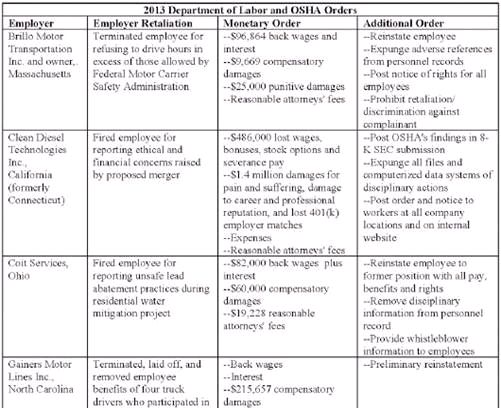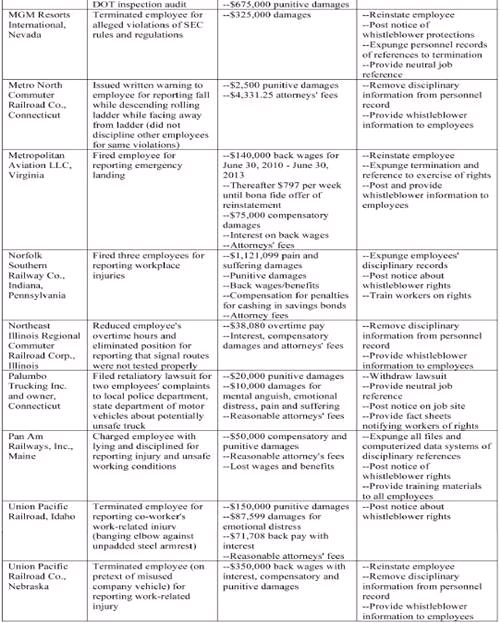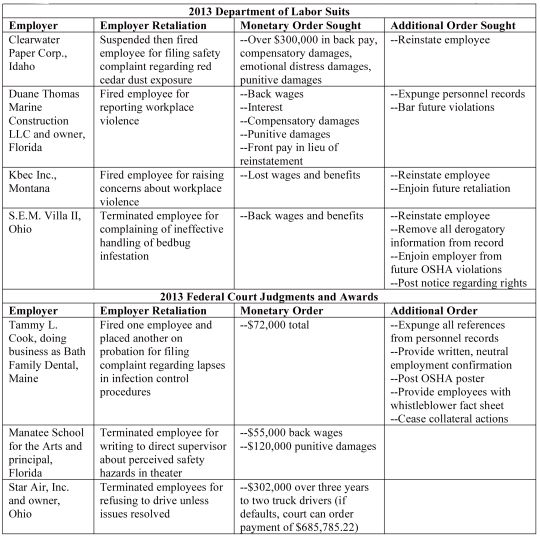The Occupational Safety and Health Administration of the U.S. Department of Labor (OSHA) protects employee whistleblowers who complain about unhealthy or unsafe working conditions by ensuring that employees who exercise their right to a healthy and safe workplace cannot be fired, transferred, denied a raise or punished in any other way. In addition to enforcing whistleblower protections for workers who exercise their OSHA rights, OSHA protects employees who report alleged violations of federal securities, trucking, airline, nuclear, pipeline, environmental, railroad, public transportation, consumer product safety, health care reform, financial reform, food safety, and seaman's protection and coast guard authorization laws. In our May 16, 2013 e-alert, we introduced OSHA's whistleblower protections. Additional information about various federal whistleblower protection laws is provided in OSHA's 200+ page Whistleblower Investigations Manual. OSHA news releases illustrate the variety of circumstances that can trigger a whistleblower complaint and the agency's and courts' stance regarding employers who retaliate against their employees for exercising such rights.
(https://www.osha.gov/pls/oshaweb/owanews_releases.level_subject?p_keyvalue=Whistleblower&p_text_version=FALSE&p_status=CURRENT&p_start=0&p_finish=0&p_direction=&p_show=100.) Examples from 2013 include:



OSHA has received thousands of whistleblower complaints over the years. Such filings are likely to increase in 2014 as employees become more aware of their rights and OSHA makes it easier to submit the complaints. According to the Assistant Secretary of Labor for Occupational Safety and Health, Dr. David Michaels, "[t]he ability of workers to speak out and exercise their rights without fear of retaliation provides the backbone for some of American workers' most essential protections." (http://www.dol.gov/opa/media/press/osha/OSHA20132324.htm) "Whistleblower laws protect not only workers, but also the public at large and now workers will have an additional avenue available to file a complaint with OSHA." (http://www.dol.gov/opa/media/press/osha/OSHA20132324.htm) This is because whistleblowers can now file complaints electronically with OSHA. (https://www.osha.gov/whistleblower/WBComplaint.html) The online form requires a certification and prompts whistleblowers to provide information, including, but not limited to:
- Employee and employer background;
- Action/event being reported (e.g., termination/layoff, suspension, discipline, negative evaluation, demotion/reduced hours, and threats);
- Reasons given by employer;
- Employee's belief about why the employer took actions (e.g., reported an accident/injury, complained to management, refused to perform a task);
- Previous complaints; and
- Other actions taken.
The complaint form also can be printed and submitted to OSHA in hard-copy format by fax, mail or hand delivery. Traditional methods of sending a written submittal or calling OSHA also can be used. When OSHA receives a complaint, it assigns a regional investigator to address the matter and follow up with the complainant. As illustrated above, the penalties for retaliating against a whistleblower can be severe. Therefore, employers should take compliance and safety seriously and avoid retaliation if issues arise or employees report problems.
The content of this article is intended to provide a general guide to the subject matter. Specialist advice should be sought about your specific circumstances.



